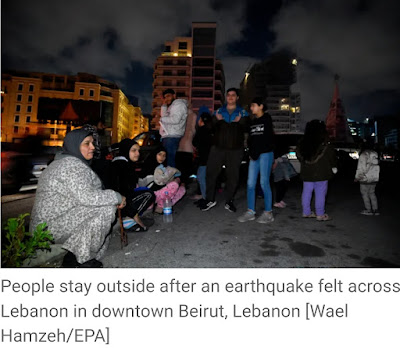Fear, terror of a new earthquake on the Turkish-Syrian border and the death of six people Live updates
Fear, terror of a new earthquake on the Turkish-Syrian border and the death of six people.
6.3 and 5.8 magnitude earthquakes hit the Turkish-Syrian border, causing more panic; Hundreds were injured.
An earthquake measuring 6.3 on the Richter scale hit Hatay province in southern Turkey and northern Syria, killing 6 people in Turkey.
Turkey's Director General for Emergency Management announced that 294 people were injured in the earthquake on Monday night.
Live updates
'Compassion not exhuasted' for shudder casualties, says Germany serve
23m ago
(10:07 GMT)
Two top German clergymen have visited the shake hit Turkish-Syrian boundary area and vowed their getting through help in help and reproduction endeavors.
"Our compassion isn't depleted in words and it won't lessen when the disaster and its ramifications are supplanted by different titles
in the news," Unfamiliar Priest Annalena Baerbock guaranteed during a joint encounter with Inside Pastor Nancy Faeser to south-eastern Turkey.
Faeser guaranteed the district of Germany's "profoundly felt fortitude" despite the huge number of casualties.
"The survivors, who have lost everything, need winter-evidence protects rapidly," she said prior to leaving for the visit.
Al Jazeera's Rob McBride, reporting from Dafene, Turkey, said Monday's earthquake in the city will "bring more suffering and misery to areas and people who have already suffered so much".
“This happened as people returned to the damaged buildings and searched their homes in search of their belongings.
“People who once lived in tents on the streets are back outside and experiencing all the damage from the earthquake. It is of incredible concern to us.”
The 6.4-magnitude earthquake struck at 8:04 p.m. local time (17:04 GMT) at a depth of 10 km, according to the Turkish Disaster and Emergency Management Agency.
Three minutes later, there was an aftershock of magnitude 5.8, followed by 31 aftershocks.
The Minister of Health Dr. According to Fahrettin Koca's report, 294 people were injured, 18 of them seriously.
The death toll this time is considered relatively low as the quake hit an area that was left largely empty after the strong quake on February 6.
Reports from the city of Antakya spoke of fear and panic in the streets as ambulances and rescue teams tried to reach the worst-affected areas, where walls of badly damaged buildings had collapsed.
"I thought the ground would break under my feet," local resident Muna al-Omar told Reuters news agency, holding her seven-year-old son in tears. He was in a tent in the city center, in a park, when there was another earthquake.
Where did it hit and for what reason was it so lethal?
The main quake was large - it enlisted as 7.8, named "major" on the authority greatness scale. It broke along around 100km (62 miles) of separation point, making serious harm structures close to the shortcoming.
Prof Joanna Faure Walker, top of the Establishment for Chance and Fiasco Decrease at College School London, said: "Of the deadliest quakes at whatever year, just two over the most recent 10 years have been of identical extent, and four in the past 10 years."
Yet, it isn't just the force of the quake that causes demolition.
This occurrence happened in the early hours of the morning, when individuals were inside and dozing.
The durability of the structures is likewise a variable.
Dr Carmen Solana, peruser in volcanology and chance correspondence at the College of Portsmouth, says: "The safe framework is tragically sketchy in South Turkey and particularly Syria, so saving lives presently for the most part depends on reaction. The following 24 hours are significant to track down survivors. Following 48 hours the quantity of survivors diminishes massively."
Here there had not been a significant quake for over 200 years or any advance notice signs, so the degree of readiness would be not exactly for a district which was more used to managing quakes.














Comments
Post a Comment